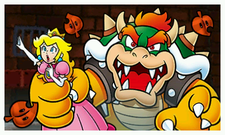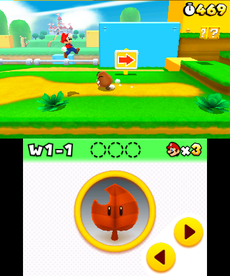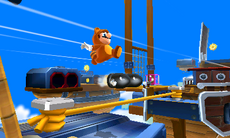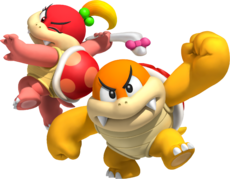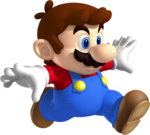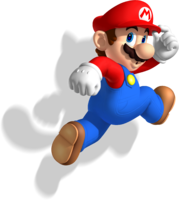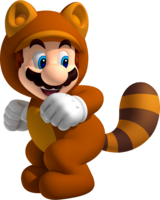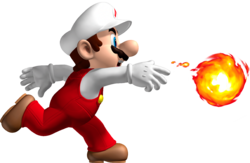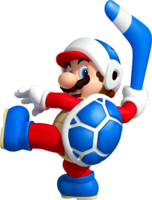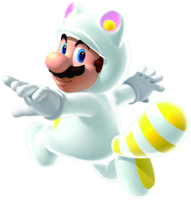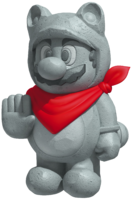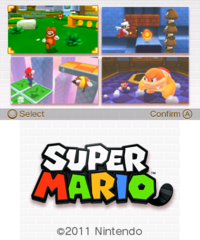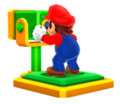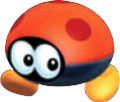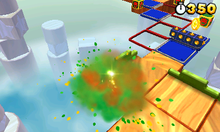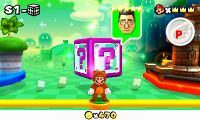Super Mario 3D Land
Super Mario 3D Land is a game in the Super Mario franchise for the Nintendo 3DS, and the first Mario game overall for the console. This is the second 3D Super Mario platformer for a handheld device (with Super Mario 64 DS being the first and a enhanced remake of the first 3D platformer adventure) and, as noted by Reggie Fils-Aime at E3 2011, the first 3D Mario platformer to be built from the ground up for a handheld system. It is the successor to Super Mario Galaxy 2. It is closely based on side-scrolling Mario games, but it is a 3D platformer in the vein of games like Super Mario 64 and Super Mario Galaxy. The game was created by the same development team that worked on the Super Mario Galaxy games and Donkey Kong Jungle Beat, currently part of Nintendo EAD Tokyo. The game is completely single player, and features no form of multiplayer whatsoever. The game received a follow-up, Super Mario 3D World, which was released for the Wii U in 2013.
Story
Outside of Princess Peach's Castle stands the Tail Tree, a Tanooki-tailed tree with Super Leaves on its branches. All of the Mushroom Kingdom is familiar with the tree. One night, a huge storm blows all of the leaves off, as Bowser laughs in the background.
Later on, Mario and three Toads (Red, Yellow, and Blue) go looking for the princess. Eventually, they discover that she is missing and the Super Leaves are gone too. Yellow Toad notices a hovering letter near the tree, and the group of four goes to investigate. Mario grabs and opens the letter, and a picture of Bowser holding Princess Peach with Super Leaves flying in the background pops out. The message shocks the three Toads and Mario, and immediately, Mario and the three Toads run to save the Princess.[video 2] Throughout his adventure, Mario receives more letters about Peach's predicament and about various stages of Bowser's Super Leaf-related plan.
Becoming lonely due to Mario's absence, Peach ultimately attempts to escape from Bowser and his army, but she is soon recaptured. Mario travels through 8 worlds and defeats Bowser, only to be tricked as Bowser escapes with Peach. Mario eventually finds Bowser's lair, but before they can battle, the floor beneath them breaks and they fall. After being chased through various obstacles, Mario manages to press a switch making the bridge under Bowser collapse, sending Bowser into a pool of lava. At last, Mario and the three Toads find Princess Peach and, using their Tanooki powers, bring Peach back to her castle.
After that, a short cutscene appears with a letter floating down in World 1-1. It appears to be Luigi being kidnapped by Dry Bowser. Mario then sets off to save Luigi. After rescuing him in Special World 1-![]() Castle, he becomes a playable character.
Castle, he becomes a playable character.
After Mario beats Special 8-Castle, another cutscene appears. Another letter has floated down on World 1-1, and the three Toads who accompanied Mario in his adventure investigates while sporting their Tanooki forms. To their surprise, Bowser has kidnapped Princess Peach again. Then, Mario or Luigi must play World 8-![]() 2 again to defeat Bowser. After that, a letter of Peach wearing a Tanooki Suit is unlocked. Once 5 stars are present on the profile, Special 8-Crown is unlocked.
2 again to defeat Bowser. After that, a letter of Peach wearing a Tanooki Suit is unlocked. Once 5 stars are present on the profile, Special 8-Crown is unlocked.
Gameplay
The levels of Super Mario 3D Land are much more linear and compact than the other 3D titles, more along the lines of the sidescrolling games. Levels rather have a time limit and even feature Goal Poles, a staple of the original Super Mario Bros. and the New Super Mario Bros. games, as opposed to Power Stars or Shine Sprites, as the level goals. When Mario is defeated, the "Too Bad" banner from every 3D Mario platformer since Super Mario Sunshine appears near the top of the screen and falls to the bottom of the screen, but a circle covers the screen instead of a Bowser symbol. Also, when the timer reaches zero, the "Time's Up" banner appears at the top of the screen. To enter pipes, the player must press or
; for the first time in the series, the player can re-enter areas through pipes at will (for example, after being transported to the above-ground flagpole in World 1-2, the player can go back down the pipe to go underground). The graphics of the game greatly resemble those of the Super Mario Galaxy games, while the levels show visual similarities to the New Super Mario Bros. titles. Gameplay also takes cues from Super Mario Sunshine, notably tight-rope walking. Unlike the 2D Mario games, the level themes in a world tend to be more generic like the galaxies of Super Mario Galaxy 2 compared to the world, instead of focusing on a particular setting per world.
Due to the merging of the 2D and 3D play styles, Mario's moveset is slightly more limited than other 3D games; he cannot triple-jump, though he can double-jump upon jumping after he lands. He also cannot Spin Jump. However, the Wall Jump, Sideways Somersault, Long Jump, and the Backflip can still be performed. Other controls take cues from the 2D titles; Mario can crouch and slide while running, which now requires the use of a run button, like in the 2D games. In addition, the version of the Backflip seen in this game is the same as the type in Super Mario Bros. 2. Finally, Mario has a new roll move that can be used to break blocks from the side and fit through small gaps.
While giving examples of how the Nintendo 3DS enhances gameplay, Shigeru Miyamoto has stated that hitting blocks from underneath in 3D Mario games would be easier with stereoscopic 3D.[1] Blocks are more prevalent in the title, unlike past 3D games, where blocks were more few and far between. Star Medals that have a similar design to the Comet Medals from Super Mario Galaxy 2 are found in each level, with collecting all three being part of the level's challenge, like in the New Super Mario Bros. games. Plus Clocks can be picked up to give the player more time to complete the level, the latter a mechanic only seen previously in Super Mario Galaxy 2's Speedy Comet missions. Mario's health system is now based on the side-scrolling titles rather than being a numbered meter: one hit shrinks Mario to a smaller size and removes his cap, while power-ups give him an extra health point. These power-ups include the Super Mushroom, the Fire Flower, the Boomerang Flower, the Statue Leaf and the Super Leaf, the last of which has not been seen since Super Mario Bros. 3. Notably, the Fire Flower, unlike its previous 3D appearances in Super Mario Galaxy and its sequel, no longer has a time limit imposed on it and is retained until Mario is hit, as in the side-scrolling games. The Item Stock from New Super Mario Bros. returns. Unlike previous titles, when Mario dies, he does not respawn in his Small Mario form, he respawns in his Super Mario form instead. When Mario dies twice in one level, a flying Roulette Block appears. Unlike the previous Mario games, the lives counter in Super Mario 3D Land extends beyond 99 and goes up to the max of 1,110 (3 crowns). This 1,110 max lives counter is also included in New Super Mario Bros. 2 and Super Mario 3D World.
The game also makes extended use of the Nintendo 3DS hardware. When the player uses a cannon or the Binoculars, the Nintendo 3DS accelerometer can be used to aim by tilting the 3DS. The game also includes a Streetpass option, where upon encounters, Mystery Boxes and Toad House items are exchanged between players. Items in Toad Houses sent by another player are recorded, including the amount of items sent by the user.
There are at least four returning tracks from Super Mario Galaxy: the Airship theme, the Sweet Sweet Galaxy theme, and a cover version of Flipswitch Galaxy's theme, Ghostly Galaxy's mansion theme, and the Cosmic Mario theme. There is also one track returning from Super Mario Galaxy 2: the theme used on Bonus Planets. The "tick-tock" that is heard when a timed Ground Pound Switch in the Super Mario Galaxy series is activated is used for when a P-Switch has been jumped on.
Controls
: Move.
/
: Choose level, Jump, Wall Jump.
- Hold (
/
): Slow fall (Tanooki Mario).
- Hold (
/
)+
: Dash
/
: Crouch, enter a Warp Pipe, enter a cannon.
- (
/
)+
: Crawl.
- (
/
)+
/(
): Roll, Tail Wag.
+(
/
)+(
/
): Long Jump.
+(
/
)+(
/
)+(
/
): Rolling Long Jump.
- (
/
)+(
/
): Ground Pound, transform into Statue Mario/Luigi (Tanooki Mario/Luigi with bandanas)
- Hold (
/
)+(
/
): Backwards Somersault
/
: Shoot Fireballs (Fire Mario), throw a boomerang (Boomerang Mario), tail whip (Tanooki Mario).
/
: Pause menu.
+(
/
):Side Somersault
change camera angle. Up, enter normal view (objects on the screen pop-out more). Down, enter extended depth view (the objects push further into the screen).
Nintendo eShop description
Platforming with serious depth! With the 3D visuals of Super Mario 3D Land, players can see exactly where floating ? Blocks and flying Paragoombas are, so that they can jump and stomp with the precision of the pros. Expert gamers will appreciate the way 3D graphics reveal the true challenge of the levels, so that they can focus on nailing the perfect jump or shaving precious seconds off their speed runs, while new players will find that 3D makes platforming simple to grasp and satisfying to master.
Try on Mario's Tanooki Suit, and put some spring in your step! While longtime gamers will delight in using Tanooki Mario's tail-spin attack to sweep enemies off their feet and fluttering through the air to land super-long jumps, a new generation will learn what makes this classic suit a fan favorite. But even seasoned players will be in for a surprise--Mario's enemies may be sporting the familiar Tanooki tail too!
Mario at his very best! Mario returns to his roots in his first 3D platforming adventure designed exclusively for a handheld system. From the frantic race-against-the-clock dash through the Mushroom Kingdom to that final leap to grab the top of the flagpole, this eye-popping addition to the Super Mario series combines everything that makes Mario great from one generation to the next.
Characters
Playable
Villains
- Bowser
- False Bowsers
- Boom Boom
- Pom Pom
- Cosmic Clone (Special Worlds only)
- Big Cosmic Clone (Special Worlds only)
- Dry Bowser (Special Worlds only)
Supporting
Transformations
| Tranformations | ||||
|---|---|---|---|---|
| Form | Power-Up | Form | Power-Up | |
| Small Mario | N/A | Mario | Super Mushroom | |
| N/A | 
| |||
| Tanooki Mario | Super Leaf | Fire Mario | Fire Flower | |

|

| |||
| Boomerang Mario | Boomerang Flower | Invincible Mario | Super Star | |
| Boomerang Flower | 
| |||
| White Tanooki Mario | Invincibility Leaf | Statue Mario | Statue Leaf | |
Enemies
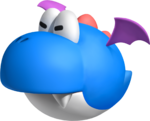
New enemies
Returning enemies
Power-Ups
New Power-Ups
- Boomerang Flower
- Invincibility Leaf (appears after the player loses five lives in a course)
- Statue Leaf (Special Worlds only)
Returning Power-Ups
- Super Mushroom
- Super Leaf
- Fire Flower
- Super Star
- P-Wing (appears after the player loses 10 lives in a course)
Items
New Items
Other items
|
|
Worlds
Normal worlds
Special worlds
Others
- Toad Houses - They work the same way as in Super Mario Bros. 3, but StreetPass friends can send gifts to the Toad House that contain items.
- Mystery Boxes - Mario can go inside them, and they contain various different tasks, such as defeating all the enemies in the box. After completing the tasks, Mario will receive Coins, 1-Up Mushrooms, and/or a Star Medal. Friends via StreetPass can also send the player Mystery Boxes, which always contain at least one Star Medal.
- A room with colored blocks that cause an optical illusion, where Mario can train and learn movements. It is accessed by remaining idle at the end of the title cutscene. The room strongly resembles Peach's Castle.
Development
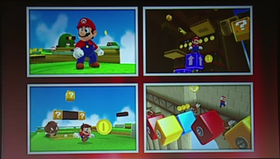
Super Mario 3D Land was first mentioned in an "Iwata Asks" interview with Shigeru Miyamoto in October 2010, where he confirmed that a brand-new Mario game for the Nintendo 3DS was already in development, but had not yet been given a proper title.[3] It was known by its tentative title, Super Mario at the time. In November 2010, Shigeru Miyamoto announced that both 2D world and 3D world Mario games were in the works for the 3DS.[4] Four screenshots were available on March 2, 2011, and the game was officially announced during the Game Developers Conference, under the name Super Mario. The logo had a Raccoon Tail on the "O" letter, similar to that of Super Mario Bros. 3's logo, which had Raccoon Mario's tail shadow behind the "3". Available screenshots of Super Mario revealed that the game is a 3D platformer and the game was stated to be developed by Nintendo EAD Tokyo's same team which had previously developed Super Mario Galaxy and its sequel, as shown how a Goomba runs after Small Mario. It even contained features from the 2D Mario side-scrolling games. Satoru Iwata stated that a more official announcement would be shown at E3 2011 on June 7. According to Iwata, "it will be a game that will come with the kind of surprises and fun that only the 3DS can offer."[5] Shigeru Miyamoto has stated that the development took over two years and started with 2 to 30 staff members working on the game.[6]
In a later interview, Shigeru Miyamoto described the title as being a combination of Super Mario Galaxy and Super Mario 64, with a little bit of New Super Mario Bros. and New Super Mario Bros. Wii. He mentioned there would be an option for a fixed camera system, very similar to the one in Super Mario 64, to demonstrate depth and the 3DS's 3D. He added, however, that it was tough to describe it, before mentioning that not only would the title be shown, but that it would also be playable at E3 2011. Shigeru Miyamoto explained that playing it will give fans a better idea of what it's like. He also commented on the speculation regarding the temporary logo, already confirming that the tail on the end of the logo's "O" was a hint at the return of Super Mario Bros. 3's Tanooki Mario.[7]
The game was given a full reveal with a trailer at E3 2011 and was playable on the show floor, as previously stated. It was announced that the game was targeted for a release by the end of the year. Attendees were allowed to try the game for themselves in four different levels - a standard plain area, an underground area, a level of switch-activated platforms, reminiscent of a few galaxies from the Super Mario Galaxy titles, and an airship level ending in a fight with Bowser's henchman, Boom Boom. In addition, the E3 2011 trailer and the conference trailer were put up for download on the 3DS eShop for a limited time. By playing the trailer on their 3DS, viewers could then see the game in stereoscopic 3D for themselves.
The main ambition of the design team was to "reset" the conventions of 3D Mario games, which were mostly designed for home consoles.[8] One of the ways of doing that was to create short, pick-up and play levels more suitable to a handheld, as opposed to the Super Mario Galaxy series, and more specifically Super Mario Galaxy 2, which director Koichi Hayashida described as a "Manchu Han Imperial Feast."[8]
The developers also wanted the game to serve as a jumping point for players that liked 2D Mario but did not want to play the 3D installments.[8] One of the solutions was to eschew the exploration-based level design of the traditional 3D Marios so that the players would not get "lost", and return the focus on reaching the end of linear levels. The levels were carefully designed to lead the player toward the end goal.[8] However, the developers included Star Medals hidden throughout the levels to cater to the 3D Mario players and thus bridge the two game design sensibilities.[8]
The development was heavily affected by the 2011 Tōhoku earthquake and tsunami.[9] Damage to the train network led to developers visiting the Kyoto office to be stuck there, and fear of aftershocks and radiation emanating from the damaged Fukushima nuclear plant caused several developers to lock themselves in their homes. These events made Nintendo unsure of whether development could continue in Tokyo.[9] Tired of not doing anything, Hayashida risked sharing his personal contact information with other members. This lead to a web forum being set up so that work could be continued while the Tokyo office was closed.[9]
The developers were pressured to finish the game in time for the 2011 holiday Season, which lead to parts of 3D Land being outsourced to other Nintendo-affiliated developers such as Brownie Brown,[9] something that does not typically happen with Mario games.
Promotion
On November 12, 2011, to celebrate the launch of Super Mario 3D Land in North America, Nintendo set up an event in Times Square's Military Island in which attendees would be able to play in a real life mock-up of the game environment, as well as a chance to play the game a day before the official release. In addition, many attendees were also given free Tanooki ears and tails, as well as free slices of mushroom pizza from a "Mushroom Kingdom" pizza truck to the first 1,000 attendees who tweeted the "#SuperMario3D" hashtag and an exclusive early sale of the game at the Times Square Toys "R" Us.[10]
Reception
Super Mario 3D Land received critical acclaim. IGN rated this game a 9.5/10[11], GameXplain reviewed the game a 4/5 stars. Euro Gamer 9/10[12], Joystiq 4.5/5[13], GamePro 5/5[14], GameInformer 9.5/10[15], N-Zone 90/100, Famitsu 38/40[16], and Edge with 8/10[17]. As of December 10, 2011, gamerankings has an average score of 90.02% out of 46 scores[18] and metacritic with an average score of 90% out of 71 reviews, 70 were positive, 1 was mixed[19]. As of March 31, 2014, Super Mario 3D Land is the 3rd best selling game for the Nintendo 3DS, having sold about 9.27 million units so far and is causing a great boost in 3DS sales.[20] It is also the fastest-selling portable Mario game ever.
Gallery
Tanooki Mario hitting a Goomba
- SM3DL-Mario Backwards Somersault Artwork.png
Mario performing a side somersault
Mario with a pair of Binoculars
- TanookiToad.PNG
Tanooki Toad
Beta elements
- Main article: List of Super Mario 3D Land beta elements
While the Super Leaf and P-Wing returned, and Hammer Mario returned in the form of Boomerang Mario, director Yoshiaki Koizumi stated that more classical suits and powers were to return, but none appear in the final product. The Goomba's Shoe was once confirmed but was later rejected.
A grassy spacious area and a level with many Donut Lifts, platforms and arrow blocks were shown, along with a array of rotating platforms which would go on to be World 4-3. Though while said to be cut from the final product, these areas might have evolved into World 2-1 and World 8-1 in the final product. The screenshots of these areas show that they use a camera angle not used in the final game, implying that the game would have had more dynamic camera angles.
Glitches
- Main article: List of glitches in Super Mario 3D Land
Template:Conjecturaltext
If Invincible Mario or White Tanooki Mario were to ground pound onto a Baddie Box, the game will start to lag as the box explodes. The "explosion" will continue and the game lags until the player jumps off of the exploding box. A harsh grinding sound is heard during the explosion, and a sound resembling that of a beanstalk coming out of an item box (in Super Mario Bros.) can be heard as Mario crouches when the player holds or
(beanstalks like this do not appear in the game). It is possible this sound is simply the sound Mario makes when he crouches, but distorted so much by the explosion it sounds like a beanstalk. The glitch can only be done on levels where Baddie Boxes appear, such as World 2-4, 5-Castle, and Special 1-3. Both Worlds 2-4 and 5-Castle require the White Tanooki suit, making Special 1-3 the only stage where the glitch can be executed after the level has been beaten once and the only stage where it can be executed by Luigi.
Template:Conjecturaltext
To perform this glitch, Mario needs to go to the airship of World 2. Then, he should enter the first Warp Box. The player should reach the end of the bonus airship, but Mario should not enter the Warp Box at the end. Instead, the player should press the left camera control button so that the camera turns to the left. Wait until the Warp Box is offscreen then immediately go inside the box before Mario loses a life. If performed correctly, Mario should lose a life while the camera pans back to the main airship.
Template:Conjecturaltext
During the boss fight with Bowser on the castle in World 1, the player must use Tanooki Mario to glide across the gap between the bridge and the platforms at the start of the fight then press the switch when Bowser jumps to the left. If done correctly, the bridge will collapse with Bowser off-screen, and the game will never end the cutscene. The player, however, can still exit the level.[21]
Staff
- Main article: List of Super Mario 3D Land staff
General Producers
Producer
Director
Planning
- Daisuke Tsujimura
Programming
- Norihiro Aoyagi (Lead)
- Atsushi Yamaguchi (System)
- Tatsuro Ota (Enemy & System)
- Hideyuki Sugawara (Enemy)
- Hideyuki Tatsuta (Enemy)
- Hirokazu Matsuda (Collision System)
- Katsuyasu Ando (Player)
- Kazuhiro Musa (Enemy)
- Kiyoshi Takeuchi (Camera System)
- Naoki Koga (Support)
- Satoshi Miyama (StreetPass)
- Takeshi Hayakawa
References to other games
- Donkey Kong: In the final battle with Bowser, Bowser throws barrels at Mario, similar to Donkey Kong.
- Super Mario Bros.: Mario's original sprite from this game appears as his world map icon on the touch screen. False Bowsers return with a similar battle style. A cover version of the main theme from this game is played in Coin Heavens and in World 2-3 (Mario is also humming the theme in the cutscene between Worlds 5 and 6). This level also contains platforms identical to sprites of Mario, Peach, Luigi and a Super Mushroom from this game and the end of the level is designed like the commonly seen end of level in that game. Special 1-3 contains platforms that are identical to a ? Block, a Goomba, a Cloud, a Bullet Bill, a Cheep-Cheep, and three fireballs and the end of the level is designed like a night time end of a level in that game. The end of level music also plays at the end of 2-3 and Special 1-3. The "crown award" used to represent a further obtention of extra lives returns, but now 3 Crowns appear instead. Mario's first encounter with False Bowser is modeled after the original encounters in SMB, including pressing a switch that will send False Bowser to his doom. True to the original game, the first False Bowser is a Goomba.
- Super Mario Bros.: The Lost Levels: Poison Mushrooms return from this game. Mario and Luigi retain their singular characteristics (Mario is more stable and balanced while Luigi jumps higher at the cost of worse traction). The phrase "THANK YOU!!" appears in the last level, but is in English instead.
- Super Mario Bros. 2: Mario and Luigi's chargeable jumps while crouching work in an identical way to that of the Power Squat Jump ability that the playable characters can perform in Super Mario Bros. 2 while crouching. The back flip addition works similarly to the upgraded version of the jump from the remake of the game in Super Mario Advance. After losing a life, Mario and Luigi start in their super forms, which is similar to how a character in this game will retain their super form after losing a life (This is also like in the 3D titles).
- Super Mario Bros. 3: Tanooki Mario, Jump Blocks and Super Leaves return; Boom Boom also makes his first appearance since this game. A cover version of the Toad House theme from this game plays while outside and inside a Toad House. The backgrounds of some cutscenes between worlds (such as after completing World 2) have mountains and item sprites reminiscent to this game. Some levels have a cover version of an overworld theme from Super Mario Bros. 3. The background of Special 8 highly resembles a Super Mario Bros. 3 level, even having the same ground style.
- Super Mario World: Some enemies, such as Grinders, return from this game. The backgrounds of some cutscenes between worlds strongly resemble those of Chocolate Island. The sound heard when Mario exits the level after beating it in this game is present in Super Mario 3D Land after Luigi's letter is seen. Also, in the E3 2011 demo, a Jump Block would make the sound when Yoshi is mounted occasionally. Mario can also keep items that he grabs. World 4-2 may be a reference to Vanilla Secret 1, World 5-4 a reference to Valley of Bowser 1, and Special 5-5 a reference to Donut Ghost House. Also, in the letter received when World 3 is completed, Mario's jumping out of the bubble will have a Super Mario World jump or Cape swing sound effect. The overworld theme is heard while going through Rainbow Notes.
- Super Mario 64: Mario's voice when falling from a high place is reused during the cutscene before Bowser's last fight. Also, a sped up version of this sound is used when Mario's falling to death. Boos also have their iconic laugh from this game.
- Super Mario Sunshine : Tightropes return as a game mechanic. The platforming concept of horizontally rotating platforms is featured in a few levels. Also, the cutscene before the true final battle features Bowser trying to squish Mario but, accidentally breaking the floor instead causing the two to fall to another part of the castle. This is similar to the cutscene before Petey Piranha's first battle; in both cases, Mario and the boss look around as the floor cracks just before they fall.
- Mario & Luigi: Superstar Saga: Tail Goombas look like Tanoombas, but without the raccoon ears and leaf on their heads. They also can't transform.
- New Super Mario Bros.: Star Coins return as Star Medals and have a similar use (unlock levels). Some flowers and bushes have a similar design to the ones from this game. Also, some levels share a similar design. A lot of returning enemies keep their NSMB designs.
- Super Princess Peach: Ball 'n' Chains swing in a pendulum-like manner again and are similar to appearance except the spiked ball is purple and not Bowser-styled.
- Flipnote Studio: The background music from Special 8 map is based on the Mario's Drawing Song.
- New Super Mario Bros. Wii: Upon getting the maximum amount of lives (1,110 lives), Super Mario loses his hat and Small Mario does the opposite; he gains his hat instead. The Propeller Block returns in the form of a box. Most of Mario's voices are reused. Flophoppers act a bit like Bramballs, as they walk around, and for every step they flip 180 degrees, and have similar suction cups (except without the leaves). Stars are earned for completing certain achievments in this game as well.
- Super Mario Galaxy / Super Mario Galaxy 2: Many level obstacles return from these games along with some of the levels' music. The Blue and Red Flipping Platforms return, but they are activated by jumping. Many levels involve traveling from one floating platform to the next, comparable to traveling to each planetoid in the Galaxy series. Also, the way Goombas "charge" returns. Luigi's death scream from these games is reused in this game. Flophoppers are similar to Swaphoppers, and Cosmic Clones and Magmaarghs return. Also, a lot of the voice and sound clips are reused. World 3-5 and Special 5-4 may be a reference to Sweet Sweet Galaxy, and Special 5-1 a reference to Flip-Swap Galaxy. Also, a strange, ghostly entity can be seen in the woods near the Flagpole of World 4-4, which bears resemblance to the three, strange, black Kodama-esque figures (Hellvalleyskytrees) seen in the background of Shiverburn Galaxy.
- Mario & Luigi: Bowser's Inside Story: The castle music in Super Mario 3D Land is similar to the Bowser's enemy battle music.
- Super Mario Advance: Super Mario Bros. 2: If Mario somersaults, his voice is similar to when he does crouch jump.
References in later games
- Mario Kart 7: The new design for the Super Leaf is used in this game - both for the item and a replacement of the old emblem of a generic leaf for the Leaf Cup. Stingbies return in the Honeybee Hive, and Cardboard Goombas also return in Piranha Plant Slide.
- Mario Tennis Open: The Tanooki Suit design is unlockable as a costume for a player's Mii in the game, plus a racket was made to fit it. Inky Piranha Plants also return in the Special Game, Ink Showdown.
- StreetPass Mii Plaza: One of the newer Puzzle Swap panels in the StreetPass Mii Plaza app for the Nintendo 3DS is Super Mario 3D Land.
- New Super Mario Bros. 2: The Invincibility Leaf, Peepas, Coin Coffers, and Goomba Towers return. Also, the Gold Block acts much like the Question Box, makes the same sound effects, but produces coins more frequently. The Super Leaf also appear with the same design. Stars can be earned on the files, like in New Super Mario Bros. Wii. Also, the max amount of lives are 1,110, and it appears as 3 crowns like in this game.
- Paper Mario: Sticker Star: The Poison Mushroom has the same design as in this game.
- New Super Mario Bros. U: Some of Boom Boom's voices in this game are reused.
- Super Mario 3D World: The Wii U follow-up takes many elements from this game (including the Boomerang Flower and also the Invincibility Leaf) and the coin blocks act the same way, but they are not found in question blocks.
- Donkey Kong Country: Tropical Freeze: When Donkey Kong does nothing for a while, he can start playing this game. He is collecting a coin while smashing a Goomba.
- Super Smash Bros. for Nintendo 3DS: A stage has been based on the game as a whole.
Media
- Main article: List of media from Super Mario 3D Land
Names in other languages
Trivia
- According to Mario creator Shigeru Miyamoto, the term Land is used in the title of this game to pay homage to past Mario titles, like Super Mario Land and its 2D art style.[22]
- The yellow switch that changes the camera angle from this game has an eye icon. This eye is the same as the one seen when in first-person mode in the Super Mario Galaxy games.
- Super Mario 3D Land is the first installment in the Mario series overall (excluding crossover installments) to be officially localised to Dutch, Portuguese, and Russian. [23] [24] [25] Mario & Sonic at the Olympic Winter Games is actually the first game with Mario officially localised to Dutch. However, it is a crossover game and it is localised and published by Sega. Nintendo also stated on its official news update: "SUPER MARIO 3D LAND™ and Mario Kart 7 include for the first time [in the Mario series] fully Dutch screen texts." [23]
- As a reference to The Legend of Zelda series, World 5-2 is based on the gameplay of the early The Legend of Zelda games (with the overhead camera view). In a particular area of that level, lighting all of the torches there opens up a gate and plays the classic "puzzle solved" tune from this series.
- From Nov. 22-Dec. 24, 2013 North American 3DS users that went to a Nintendo Zone could receive an Exclusive Mystery Box from Mr. Hayashida, the producer of Super Mario 3D Land.
- This game is one of the four games Donkey Kong plays on his Nintendo 3DS XL during his idle animation in Donkey Kong Country: Tropical Freeze along with Mario Kart 7, Donkey Kong Country Returns 3D and Animal Crossing: New Leaf.[26]
- This is the first 3D Mario platformer to receive a indirect sequel as well the second one to receive a sequel with Super Mario Galaxy being the first with it's sequel.
External links
- Launch Trailer
- Official Japanese Website
- Official North American Website
- Official European Website
- Official Australian Website
- Official Chinese Website
References
- ^ GDC: Super Mario 3DS Revealed
- ^ Nintendo @ GDC 2011
- ^ Iwata Asks: Super Mario Bros. 25th Anniversary
- ^ Video Games Blogger - Super Mario 3DS games on the way in 2D and 3D, says Shigeru Miyamoto
- ^ Nintendo CEO Satoru Iwata on 3DS Mario and Sales Targets
- ^ [1]
- ^ Super Mario 3DS Combines Galaxy and Mario 64, Will be at E3
- ^ a b c d e Iwata Asks: Super Mario 3D Land (accessed April 02 2012)
- ^ a b c d Cite error: Invalid
<ref>tag; no text was provided for refs namedWired - ^ [2]
- ^ http://ds.ign.com/articles/121/1211974p1.html
- ^ http://www.eurogamer.net/articles/2011-11-10-super-mario-3d-land-review
- ^ http://www.joystiq.com/2011/11/09/super-mario-3d-land-review/
- ^ http://www.gamepro.com/article/reviews/224745/review-super-mario-3d-land-3ds/
- ^ http://www.gameinformer.com/games/super_mario_3d_land/b/3ds/archive/2011/11/09/super-mario-3d-land-review-mario-returns-to-rescue-the-princess-and-the-3ds.aspx
- ^ http://gonintendo.com/?mode=viewstory&id=164781
- ^ http://n4g.com/news/884809/edge-super-mario-3d-land-review
- ^ http://www.gamerankings.com/3ds/620831-super-mario-3d-land/index.html
- ^ http://www.metacritic.com/game/3ds/super-mario-3d-land
- ^ http://www.zdnet.com/blog/btl/super-mario-3d-land-release-in-japan-skyrockets-nintendo-3ds-sales/63054
- ^ http://www.youtube.com/watch?v=e-eIBZ19JMc
- ^ http://www.youtube.com/watch?v=yJHeRRp_R_Y
- ^ a b Nintendo of the Netherlands - Geef Bowser een zwieper - de Tanooki power-up is terug
- ^ Nintendo of Portugal - SUPER MARIO 3D LAND e Mario Kart 7 chegam à Nintendo 3DS em português!
- ^ Nintendo Russia - Official Super Mario 3D Land Website
- ^ [[3]]
